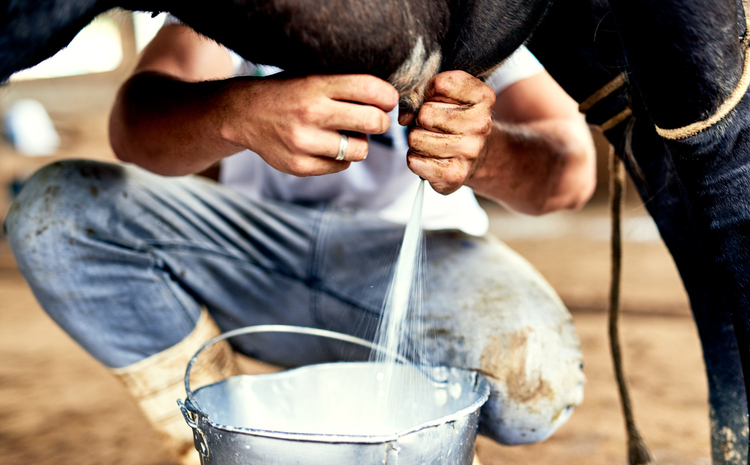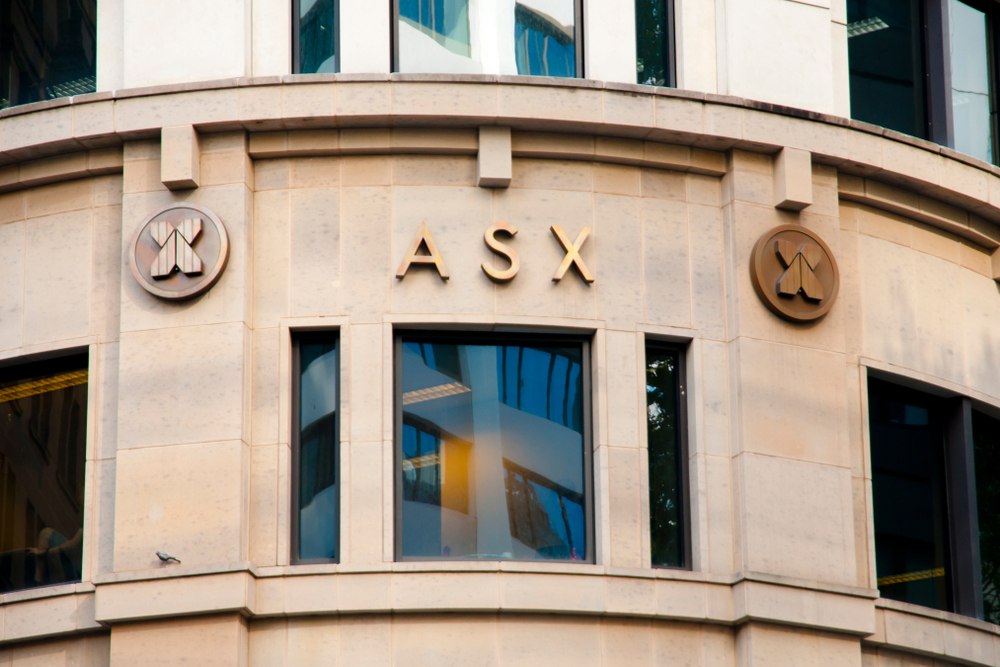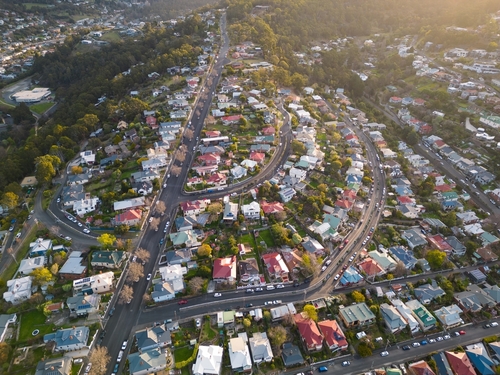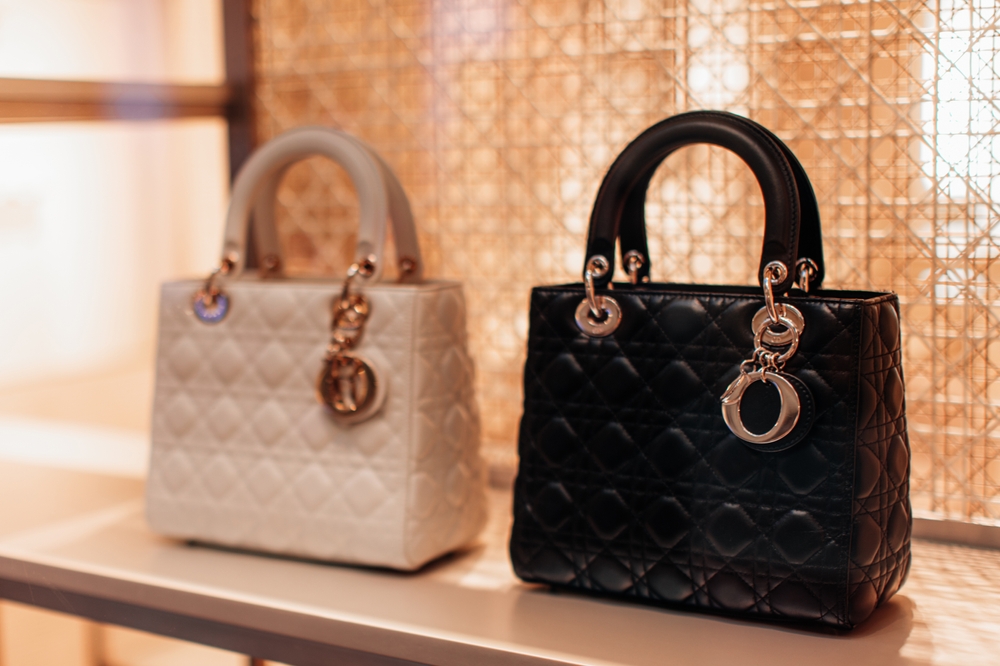Raw Milk and the Rise of ‘Food Freedom’
Interest in unpasteurised dairy is soaring despite health risks, thanks to lifestyle influencers, commentators and politicians promoting its consumption
Dairy farms have been in decline for decades, but you wouldn’t know it looking at Mark McAfee’s. Based in Fresno, Calif., his business has grown substantially since 2020, he said, and is on track to hit $30 million in sales this year.
His company, Raw Farm, is the largest supplier of unpasteurised milk in California. Gwyneth Paltrow is a fan of the brand, whose products can be found at the specialty grocers Erewhon and Sprouts. Podcast hosts and social-media personalities have fuelled demand, claiming that raw milk is creamier, more nutritious and easier to digest than pasteurised dairy.
“Influencers have really driven us in the last four years to new levels we never imagined,” McAfee said in an interview.
The Food and Drug Administration has long warned Americans against drinking unpasteurised milk, which can expose consumers to salmonella, listeria and E. coli, and has the potential to cause rare and serious disorders. The FDA has said raw milk is not healthier than pasteurised and, in fact, raises the risk for harm. Selling raw milk is legal in California and more than half of U.S. states, but its sale across state lines has long been banned by the FDA, which warns that drinking unpasteurised milk can cause bacterial outbreaks that have resulted in miscarriages, stillbirths, kidney failure and death. It can be particularly unsafe for children, the elderly, immunocompromised people and pregnant women, the agency says. This year, the FDA warned about the risk of bird-flu contamination amid an outbreak that has infected dairy cows. Twenty states have laws on the books prohibiting raw milk in some form.
But in many corners of the internet, raw milk is presented as healthy, wholesome and cool. Some people brag about obtaining it in states where retail sales are illegal. “I have a dealer,” said Texas-based influencer Lauryn Bosstick on her popular podcast, “The Skinny Confidential Him & Her.” In an email, Bosstick said “I love raw milk.” As a guest on the show, Paltrow , who lives in raw-milk-friendly California, said she drinks raw cream in her morning coffee and that Raw Farm is her favourite.
Others have turned their preference into a political stance, a way of rallying against what they see as government overreach. Robert F. Kennedy Jr. has voiced support for “food freedom”—a term that has come to encompass everything from intuitive eating to diets that the FDA has deemed dangerous. He has expressed solidarity with Amos Miller, a Pennsylvania-based Amish farmer whose business has run afoul of raw-milk regulations and faced consequences as a result. Kennedy said he “only drank raw milk” while on a 2022 panel at a conference for anti vaccine nonprofit Children’s Health Defense, which he chairs. His running mate, Nicole Shanahan , recently posted a photo on Instagram in which she smiles while hugging two people at a farmers’ market selling raw milk.
“Mr. Kennedy believes that consumers should be able to decide for themselves what foods to put into their bodies,” a spokesperson for Team Kennedy said in an emailed statement.
Trust in the U.S. government and American media are at near-record lows, driving people to seek alternative authorities and information sources. For many, influencers and self-styled experts have filled the void. As a growing number of them tout products that could cause harm, people across the country are drinking it up.
Farmers Against Pasteurisation
The federal government set its first safety standards for dairies in 1924, introducing regulations that states could adopt on a voluntary basis. This followed many disease outbreaks linked to milk, including typhoid fever, scarlet fever and tuberculosis. Pasteurisation, a heating process that kills harmful bacteria such as E. coli, listeria and salmonella, became the norm as dairy farmers and sellers sought to prevent food borne illnesses.
But soon a group of dissenters emerged, arguing that pasteurisation stripped milk of its nutrients. That cohort included the owner of the Monrovia, Calif.-based farm Alta Dena, which would become a major supplier of raw milk.
Unpasteurised milk appealed to the counterculture and became linked with the growing natural and organic food movement of the 1970s. But following various outbreaks, legal challenges and a 1987 FDA ban on interstate raw milk sales that remains in effect today, Alta Dena stopped selling unpasteurised products and sold its farm. The Alta Dena brand exists today but sells pasteurised milk and other dairy products. McAfee’s farm, founded in 1998 as Organic Pastures, stepped up to grab its market share.
“That really helped us to establish our business,” McAfee said. But he has run into some trouble. In 2008, McAfee and the company pleaded guilty to misbranding raw milk as pet food in order to sell it across state lines. A court order two years later demanded that the company cease selling its raw-milk products for any purpose between states and stop making drug claims about its products, unless authorised by the FDA. In 2023, the Justice Department alleged that Raw Farm had violated the court order by selling raw-milk cheese across state lines and claiming it could cure, mitigate, treat or prevent disease. Raw Farm agreed to settle the dispute. Now, the Justice Department is seeking to enforce the settlement following recent outbreaks of salmonella and E. coli it says were linked to Raw Farm’s raw milk and cheddar cheese ; Raw Farm denies there was E. coli in its cheddar cheese product. Raw Farm’s raw milk is only available in California; its unpasteurised cheese is sold beyond California, as well as a raw-milk pet food kefir.
In the early aughts, Mary McGonigle-Martin started seeing raw milk at her local health-food store in Temecula, Calif., where signs framed the dairy product as a cure for asthma, allergies and other ailments. Skeptical at first, she went to Organic Pastures’ website to learn more. “They talked about how they tested every batch of milk and they never found a pathogen,” she said. She decided the milk was safe for her 7-year-old son to drink. “It was very naive of me,” she said.
McGonigle-Martin’s son Chris became severely ill after drinking the milk for a couple of weeks. He was hospitalised, required blood transfusions, put on a ventilator and diagnosed with hemolytic uremic syndrome, a rare but serious kidney condition. Though Chris survived, McGonigle-Martin and another family whose child became sick sued McAfee and Sprouts for negligence and product liability, claiming that their children suffered from E. coli. The parties settled for an undisclosed amount in 2008. McGonigle-Martin has since become an activist, working to warn parents about the risks for children.
McGonigle-Martin said she believes that farmers who advocate for raw milk have good intentions but are ultimately spreading what amounts to misinformation.
Meanwhile, interest is way up. GetRawMilk.com, which aims to help consumers find local suppliers, has experienced a surge in views in recent months. Its creator said in an email that the site’s traffic has been “hitting new all-time highs,” with nearly 97,000 visitors in May.
The Influencer Effect
At the upscale Los Angeles grocery store Erewhon, a 64-ounce jug of McAfee’s Raw Milk retails for $11.99. Each bottle carries a warning: “Raw milk and raw milk dairy products may contain disease-causing microorganisms.” According to the label, those at highest risk of disease include “newborns and infants; the elderly; pregnant women.”
The pandemic brought “explosive” growth to the business, McAfee said. “People got smart and they said, ‘Well, what is the most immune-system-building food on earth?’” One study, published by the CDC’s Emerging Infectious Diseases journal in 2017, found that unpasteurised dairy products were associated with roughly 840 times more illnesses and 45 times more hospitalisations than pasteurised products.
On social media, where “What I Eat in a Day” videos are popular, doctors, nutritionists and lifestyle personalities have praised raw-milk consumption. “This is why you should be drinking raw milk,” says Paul Saladino, a doctor who once sold people on his “Carnivore Diet,” in a video on Instagram, where he has two million followers. In an April TikTok , the “Skinny Confidential” host Bosstick describes the “bowl of meat” she eats “probably twice a day,” crediting it for weight loss and hair growth. “I also do raw milk,” she says.
Tieghan Gerard, creator of the popular food blog Half Baked Harvest, incorporated raw milk into an iced peach-lemonade matcha latte recipe. Hannah Neeleman , a pageant queen and influencer whose @BallerinaFarm Instagram account has nine million followers, posts videos of herself and her children drinking raw milk directly from the udders of their cows in Utah. The farm she shares with her husband is slated to open Ballerina Farm Dairy in the coming weeks, Neeleman said. It will sell raw milk, among other unpasteurized dairy products, in the state.
Meanwhile, commentators for conspiracy theorist Alex Jones’ website Infowars have downplayed the risks of raw milk , chalking up warnings to collusion between the FDA and “Big Milk.”
McAfee says Raw Farm does not pay any influencers or celebrities to promote its products, but it ships free products to roughly 350 influencers a year. He says many more have been promoting products they paid for themselves. “They go crazy telling you how delicious it is,” he said.
Bill Marler, a personal injury attorney in Washington state focused on food borne illness cases, has sued McAfee on several occasions, including while representing McGonigle-Martin. “They’re a big player and Mark is a proselytiser,” he said.
Another big advocate is the Weston A. Price Foundation, an organisation founded in 1999 with the stated goal of bringing back “nutrient-dense” foods to Americans.
Sally Fallon Morell, its founding president, owns a farm in Maryland that sells raw milk for pets. Maryland state law prohibits the sale of raw milk for human consumption. She claims there is no scientific reason to oppose raw milk and offers alternative explanations for the few instances the FDA has said people died or became ill from drinking it. Through her Farm-to-Consumer Legal Defense Fund and her website Real Milk, she advocates for the consumption of unpasteurised dairy and criticises federal food regulation and nutrition guidelines.
“We’re giving our children skim milk, processed foods, loaded with additives, industrial seed oils, lots of sugar,” she said. “We’re at the 11th hour, and things have got to change or there’ll be no people,” she added, calling it a “genocide” what children are being fed in school.
Her foundation made it a mission to make unpasteurised milk legal in every state . According to the foundation, raw milk can be obtained in 46 states, through retail or direct sales, herd share agreements or as pet food. According to the FDA, only 30 states can legally sell raw milk for human consumption.
On an October episode of the organisation’s “Wise Traditions” podcast, Fallon Morell spoke about Nevada, where raw milk for pets must be marked with dye. She shared a desire to “get them to lift that.”
Soon, McAfee said, he’ll be selling frozen raw milk labeled as pet food in all 50 states, using a label he said the FDA approved. The FDA did not confirm whether it had approved the label, but a spokesperson said that if the agency becomes aware of the diversion of raw milk labeled for pets into the human food supply, it will take the appropriate action.
“The influencers, all day long, they say, ‘I identify as an animal, get this stuff, this stuff is awesome,’” said McAfee. “They know that it’s exactly the same product they sell in California with a different label.”
 Copyright 2020, Dow Jones & Company, Inc. All Rights Reserved Worldwide. LEARN MORE
Copyright 2020, Dow Jones & Company, Inc. All Rights Reserved Worldwide. LEARN MORE
This stylish family home combines a classic palette and finishes with a flexible floorplan
Just 55 minutes from Sydney, make this your creative getaway located in the majestic Hawkesbury region.
Continued stagflation and cost of living pressures are causing couples to think twice about starting a family, new data has revealed, with long term impacts expected
Australia is in the midst of a ‘baby recession’ with preliminary estimates showing the number of births in 2023 fell by more than four percent to the lowest level since 2006, according to KPMG. The consultancy firm says this reflects the impact of cost-of-living pressures on the feasibility of younger Australians starting a family.
KPMG estimates that 289,100 babies were born in 2023. This compares to 300,684 babies in 2022 and 309,996 in 2021, according to the Australian Bureau of Statistics (ABS). KPMG urban economist Terry Rawnsley said weak economic growth often leads to a reduced number of births. In 2023, ABS data shows gross domestic product (GDP) fell to 1.5 percent. Despite the population growing by 2.5 percent in 2023, GDP on a per capita basis went into negative territory, down one percent over the 12 months.
“Birth rates provide insight into long-term population growth as well as the current confidence of Australian families,” said Mr Rawnsley. “We haven’t seen such a sharp drop in births in Australia since the period of economic stagflation in the 1970s, which coincided with the initial widespread adoption of the contraceptive pill.”
Mr Rawnsley said many Australian couples delayed starting a family while the pandemic played out in 2020. The number of births fell from 305,832 in 2019 to 294,369 in 2020. Then in 2021, strong employment and vast amounts of stimulus money, along with high household savings due to lockdowns, gave couples better financial means to have a baby. This led to a rebound in births.
However, the re-opening of the global economy in 2022 led to soaring inflation. By the start of 2023, the Australian consumer price index (CPI) had risen to its highest level since 1990 at 7.8 percent per annum. By that stage, the Reserve Bank had already commenced an aggressive rate-hiking strategy to fight inflation and had raised the cash rate every month between May and December 2022.
Five more rate hikes during 2023 put further pressure on couples with mortgages and put the brakes on family formation. “This combination of the pandemic and rapid economic changes explains the spike and subsequent sharp decline in birth rates we have observed over the past four years,” Mr Rawnsley said.
The impact of high costs of living on couples’ decision to have a baby is highlighted in births data for the capital cities. KPMG estimates there were 60,860 births in Sydney in 2023, down 8.6 percent from 2019. There were 56,270 births in Melbourne, down 7.3 percent. In Perth, there were 25,020 births, down 6 percent, while in Brisbane there were 30,250 births, down 4.3 percent. Canberra was the only capital city where there was no fall in the number of births in 2023 compared to 2019.
“CPI growth in Canberra has been slightly subdued compared to that in other major cities, and the economic outlook has remained strong,” Mr Rawnsley said. “This means families have not been hurting as much as those in other capital cities, and in turn, we’ve seen a stabilisation of births in the ACT.”
This stylish family home combines a classic palette and finishes with a flexible floorplan
Just 55 minutes from Sydney, make this your creative getaway located in the majestic Hawkesbury region.






















